- Home
- Craig Schaefer
Harmony Black (Harmony Black Series Book 1) Page 2
Harmony Black (Harmony Black Series Book 1) Read online
Page 2
“Mom?” I said. “Can I hold her?”
The light caught my mother’s face as she turned toward me. She’d been crying, I thought at first. Then, taking a step closer, I realized they weren’t tears. Her eyes were leaking blood. Two little trickles of crimson, dripping down her sallow cheeks.
“You, too,” she whispered, her voice a hoarse rasp as she held her hand out to me. “You come, too. Come to Mama.”
“Harmony?” said the sleepy voice behind me. “Are you awa—”
The voice stopped dead. I slowly turned around. My mother stood in the bedroom doorway, her face a mask of frozen horror as she stared at the impostor clutching her infant daughter.
Linder said something. Jolted from my memories, I had to ask him to repeat himself.
“You won’t be going in alone,” he repeated, sliding a sheaf of papers from his briefcase. “Like I said, there’s a team on the ground already. This is a kidnapping—a federal crime, which gives us the perfect excuse to involve FBI assets.”
“Not me, though,” I said. “I’m still attached to the Seattle field office. I was able to follow the Carmichael case to Vegas only because it started on my home turf.”
Linder rapped his knuckles on the paperwork.
“Not anymore. As of one hour ago, you’ve been reassigned to CIRG. The Critical Incident Response Group gives tactical and intelligence support wherever and whenever it’s needed, which means I can drop you right into the hot zone. Officially, you report to SAC Walburgh of the Crisis Management Unit.”
“And this Walburgh is a friendly?” I asked.
“She doesn’t exist. You can’t get friendlier than that.”
“I’ve always worked alone before,” I said.
Linder shook his head. “I’m not taking any chances. This thing’s been dormant for thirty years. We miss our shot, it could be another thirty before it comes back again. I’m putting our best team on it, cell designation Circus. You’re there to provide personal insight and occult support. They . . . recently lost a key member, so you’ll be filling a gap.”
“Circus?” I arched an eyebrow at him.
He shrugged. “They get results. Pack up and roll out: a plane ticket’s waiting for you at JFK. I’ll send the itinerary to your phone.”
He locked his briefcase and stood to go.
“Keep me in the loop,” he said. Then he was gone, walking out the door and leaving me alone with the past.
My whole body felt numb, but I pushed myself out of the chair and trudged upstairs to the guest room. Vacation was over. I traded my sandals for polished black shoes; my T-shirt and jeans for a crisp white blouse, black suit jacket and slacks, and a black necktie.
My mother waited for me down in the parlor. She sat in the gloom beside a drawn window shade, staring at nothing at all. One hand idly stroked the fat, purring Maine coon in her lap, but her attention was a million miles away.
“You know,” I said, standing at the edge of the room.
“Grizabella,” she said, nodding at the cat. “She hears everything.”
“I don’t want you to get your hopes up. Even if I can stop this thing, it doesn’t mean we’ll get Angie back. There might not . . . be anything to get back.”
“But you’ll try.”
“I’ll try,” I told her.
I went back upstairs and packed my rolling suitcase, the home I’d been living out of for longer than I cared to remember. I was still paying rent on a shoe-box apartment in Seattle, but at this point it was just a place to keep my extra stuff. The packing went quickly, almost mindlessly, the preflight checklists a drill hammered into me by repetition. Toothpaste, toothbrush, hairbrush, check.
“Take this with you,” my mother said from the doorway. She held out a tiny worn-out teddy bear with tan fur and stitched eyes, just a little taller than a baseball. I frowned at it. It looked familiar.
“You don’t remember,” she said. “He used to be yours. He chased away bad dreams, you used to say. The day we brought your little sister home from the hospital, you decided she should have someone to watch over her while she slept. He was . . . in her crib that night.”
I took the bear and slipped it into my suitcase.
She pulled me into a hug, her breath hot against my shoulder.
“Your father would be so proud of you right now,” she whispered.
“I do my best,” I said, “but I can always do better.”
She smiled sadly as she pulled away, holding me at arm’s length, looking me over.
“That’s what he used to say, too. All right. Get out there, Special Agent Black. Give ’em hell.”
One last hug and I was gone, bound for another plane and another nightmare.
Two hours in the air—half of it with a kid drum-kicking the back of my seat—and I touched down at Detroit Metropolitan Airport. From there it was just a half-hour taxi ride to 477 Michigan Avenue. I spent most of the trip with my phone in my face, memorizing the details Linder sent me.
The Patrick V. McNamara Federal Building rose up from the Detroit skyline like a clenched fist of concrete. I waited in line at the security checkpoint just inside the front doors. Eventually I made it to the front desk, flashed my badge and credentials, then took an elevator up to the FBI offices on 26, where I had to do it all over again.
I almost cracked a smile. If I squinted a little and didn’t look out the window, I could imagine I was back at my old field office in Seattle. Same slate-gray cloth cubicles, same rows of identical government-issue computers and desk phones, same information security flyer taped up over the same water cooler.
Once they’d checked my bona fides, the receptionist printed off a visitor’s badge and passed it through a hot laminator before handing it over to me.
“Here you go, and”—she paused, glancing down at a visitor’s log—“Special Agent Temple and her consultants are already here. They’re waiting in conference room two—just go right up this hall, take a left at the end, and it’s the first door you’ll see.”
Consultants? I hadn’t been expecting that, but the way my day had gone so far, I shouldn’t have been surprised about anything. I snapped the visitor’s badge to a lanyard and put it on, bracing myself as I walked up the hallway. I came to the conference-room door and gave what I hoped sounded like a confident knock.
It opened a few inches. The woman on the other side was wiry, with deep-brown skin and black hair pulled tight in a frizzy bun. What struck me, though, were her eyes: they were too blue to be real, almost turquoise.
“You aren’t an extra-large pepperoni pizza,” she said.
“Uh, no. No, I’m not.”
“Then you must be the witch we ordered. C’mon in!”
She shut the door behind me, grabbed my hand, and gave it a pump. “Jessie Temple.”
“Harmony Black.”
“We know. Linder told us you were coming. You were running that Enclave Resort operation in Vegas, right? Heard they had to scoop Lauren Carmichael off the sidewalk with a spatula. Your work? Very flashy.”
“Not entirely,” I said, wincing. “It’s a long story.”
“And we don’t have time for it,” said an older woman in a wheelchair sitting at the far end of an oval conference table. Her aged hands rested regally on the varnished beech wood, flanked by a cup of coffee and a pad of paper filled with neat, prim handwriting.
“True,” Jessie said. “Harmony, this is Dr. April Cassidy. Auntie April was one of the original BAU pioneers—”
“Behavioral Science Investigative Support Unit, at the time,” April said, a faint Irish accent lilting on the edges of her words. “Let’s be thankful for brevity, hmm?”
“She pretty much has an encyclopedic understanding of freaks, monsters, fiends, and politicians.”
“Dr. Cassidy,” I said, the name ringing a four-alarm bell. “I’ve read your work! I studied your PhD dissertation when I was at Quantico. It was brilliant, years ahead of its time.”
“Thank
you, dear, and please, call me April.” She shot a steely look at Jessie. “Not Auntie April. I regrettably left the Bureau quite some time ago—taking an ax to the lower vertebrae tends to limit your prospects for career advancement. I’ve been in private practice ever since, but Jessie was kind enough to bring me on as a consultant.”
“Last but not least,” Jessie said, walking around the table, “meet Kevin Finn, which is not his original name.”
The teenager on the other side of the table, a string bean in a World of Warcraft T-shirt, looked up from his laptop and raised his hand in greeting. “Hey.”
“Not his original name?” I asked.
Jessie clamped her hand on Kevin’s shoulder. “At the tender age of seventeen, Mr. Finn learned a valuable lesson: if you’re going to hack into a stranger’s bank account, make sure it doesn’t belong to a high-ranking member of the Gambino family.”
“I ended up in WitSec,” Kevin said, looking sheepish. “Jessie pulled me out and made me an offer I couldn’t refuse. I mean, it was either join her team or work in a doughnut shop in Albuquerque for the rest of my life.”
“Now,” Jessie said, “he uses his big brain to fight for the forces of good, seeking redemption for his tragically squandered criminal youth.”
Kevin touched his hand to his chest and bowed his head. “I am but your humble slave, m’lady.”
“Ha.” Jessie slapped his shoulder and walked back toward me. “You wish you were.”
I blinked. “You . . . pulled an informant out of Witness Protection?”
“I needed a hacker.” She shrugged. “Turned out he was useful, so I kept him.”
“What about your fourth? Linder said you lost a member recently?”
Jessie’s smile deflated like a pinpricked balloon, and the room fell silent.
“The job Linder pulled us off for this one,” Kevin muttered, staring at his laptop screen as he sank down in his chair.
“We’ll get back to it,” Jessie told him, her voice low. “Don’t you worry about that. There will be some righteous fuckin’ payback, just as soon as we take care of business here. Little babies going missing? That’s gotta come first.”
“I know,” he said. “It’s just . . . ”
“I know.” Jessie looked my way and gave a little shake of her head. Dangerous territory. I recognized the signs and resolved to mind my footing.
“We should get started,” I said, eager for a change of subject.
“Quite right,” April said, gesturing across the table. “Kevin, set up the projector, please. If one of you ladies would dim the lights, we can begin the briefing.”
THREE
We sat around the table in the projector’s silent glow, watching the images Kevin’s laptop tossed up on the blank white wall. The first was a police station booking photo: the woman I’d seen in the still from the nanny cam, but instead of blood, those were real tears staining her cheeks.
“Helen Gunderson,” April said. “Twenty-six years old, single mother, lifelong resident of Talbot Cove. Woke up to find her son, Elliot, missing from his crib. She immediately reported it to the authorities, leading to her arrest once they played back the video from the nanny cam in his room. Kevin?”
He tapped a few keys and a grainy video flooded the wall. Elliot slept in his crib. A shrill, slow creak groaned from somewhere off camera, and then a shadow shuffled into the frame. It was a woman, hunched at the shoulders, bare arms spindly and her hands curled into hooks. She whispered to herself—some kind of raspy, singsong drone—but I couldn’t make out a single word.
Just like the first time I’d heard the thing speak, thirty years ago.
She reached into the crib, scooping out the sleeping infant inside, and cradled him in her arms. She turned back, finally facing the camera. It was hard to see unless you knew what to look for—unless you knew what you were looking at—but I couldn’t miss the thin trails of blood leaking from her bottom eyelids. They rolled down her cheeks and her chin, dripping onto the sleeping baby’s upturned face.
The creature masquerading as Helen Gunderson shuffled out of the room. Then that same shrill creak, and silence.
Kevin froze the video on an empty cradle.
“Ladies and gentleman,” April said grimly, “meet target designation Hostile Entity 17: the Bogeyman. Unfortunately for Ms. Gunderson, she’s been charged with faking the abduction of her son and hiding the child. Unless we can find her boy, he will be presumed dead, and his mother will be prosecuted for a murder she didn’t commit.”
“Not the first time that’s happened,” Kevin said, tapping away. Faded newspaper clippings sprouted up over the paused video. “Thirty years ago, over a two-week period, there were five infant and toddler abductions in Talbot Cove. At one incident, neighbors out for a midnight stroll saw the ‘father’ through a window, taking his child from the crib, though he told the police—truthfully, as it happens—he’d slept through the night. He was arrested, handed a life sentence, died in a prison-yard brawl. He went to his grave protesting his innocence. Four of the abductions remain officially unsolved, and the last, whence we take H. E. 17’s lovely nickname, turned violent.”
LOCAL SHERIFF MURDERED BY HOME INVADER screamed the headline as Kevin magnified it on the wall. The black-and-white picture of my father was a file photo, taken in happier times.
“Now, Sheriff Harry Black was home with his wife, Elise, and his daughters, Angie and Harmony, when . . . ” Kevin’s voice trailed off. He looked my way.
“Linder didn’t tell you,” I said, answering the question on his face.
Jessie slumped back in her chair. “Fuck. Another Linder surprise. It must be a Tuesday.”
“I’m sorry,” Kevin said. “When I complained about getting pulled onto this case earlier, I mean, this has gotta be personal for you—”
I crossed my arms. “It was a long time ago.”
Jessie fixed her bright-blue eyes on me. I realized something strange, just then: in the last ten minutes, I hadn’t seen her blink once.
“Well,” she said, “seeing as the newspaper account is probably bullshit, how about you tell us what really went down that night?”
“Harmony,” I remembered my mother whispering from the doorway, “get behind me. Now.”
I couldn’t stop staring at her bleeding doppelgänger, still holding an expectant hand out to me, cradling my baby sister in her other arm.
“You come, too,” it rasped again. “Come to Mama.”
I took an unsteady step to one side, backing toward the corner of the nursery, getting out of the line of fire. Something swirled in the room, a slow-building maelstrom of pressure that made my ears pop and my teeth ache.
“You,” my mother said, locking eyes with her twin. “Put her down.”
The creature clutched Angie tightly. “Mine.”
The unseen winds churned faster, building like a cyclone I could only feel under my skin. My blood shivered. It was the first time I’d ever touched the currents of magic, and I’d never forget the sensation, just like I’d never forget the look of absolute rage on my mother’s face.
“Put. Her. Down!” she roared, lunging out with both hands, pressing her open palms toward the creature. The air rippled and turned to spun glass. Translucent, scalloped spears of hardened air blossomed like ice crystals, spearing toward the creature, harpooning its stomach and shoulder.
Blood guttered from its wounds as it twisted and thrashed, breaking free, still clinging desperately to Angie with one arm. The baby was awake now and squalling, struggling. The creature raised its free hand and brought it down in a smashing fist; my mother’s spell broke, the crystallized air shattering into a rain of broken glass on the shag carpet. Then it hissed and charged, coming for my mother like a freight train, lashing out with a brutal backhand and sending her sprawling to the floor.
I ran after it. I don’t know what I thought I could do. I just knew I had to try.
My father heard the shouting. He was in t
he kitchen at the end of the hall, wearing his boxer shorts and clutching his service revolver. Coming to the rescue.
The creature barreled toward him. He saw its face and paused, just for a heartbeat, confused.
“Elise?” he said. “What’s wrong with—”
It lashed out with fingernails suddenly turned long, hard, and black and slashed his throat open.
I think I screamed. I don’t remember that part. I just remember being down on my knees on the cold linoleum, grabbing my father’s chest like I could hug him back to life, listening to him drown in his own blood.
The choking, gurgling sounds stopped. There was something left in his eyes, one last spark of light, and he gave me the faintest smile as his big, strong fingers squeezed my arm. Then he was gone.
Cherry- and snow-colored lights strobed outside the kitchen window. My mother took hold of my shoulders, pulled me off my father’s dead body, and turned me to look at her. She fought through her own tears, making sure I listened.
“You were in your room the whole time. You didn’t hear or see anything. Harmony, these men . . . you can’t tell them the truth. They won’t believe you. Just say you were in your room. Promise me.”
The house filled up with uniforms, big clunky shoes tromping everywhere, the air filled with crackles and radio static. Barry, one of my father’s deputies, took me into my room. He was a kind-faced man, still carrying some baby fat in his twenties, and he put a blanket over my shivering shoulders and brought me a mug of hot chocolate.
My mother spun them the only story they could accept. In her version, the intruder was a strung-out junkie with a straight razor. Probably somebody Dad had busted, looking for revenge or just cash for a quick fix.
“Don’t you worry,” Barry told me, crouching down beside my chair to talk face-to-face. “We’re gonna get this guy, and we’re gonna get your little sister back. Every policeman in this city is going to be searching, night and day. I’m also leaving people to watch the house, to keep you and your mom safe.”

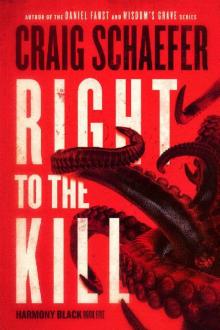 Right to the Kill (Harmony Black Book 5)
Right to the Kill (Harmony Black Book 5)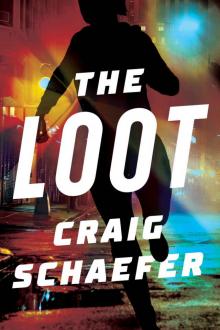 The Loot (Charlie McCabe Thriller)
The Loot (Charlie McCabe Thriller)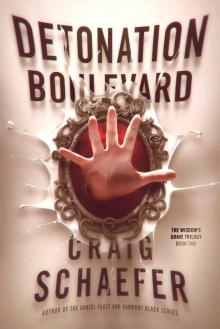 Detonation Boulevard
Detonation Boulevard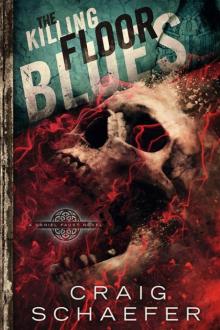 The Killing Floor Blues (Daniel Faust Book 5)
The Killing Floor Blues (Daniel Faust Book 5)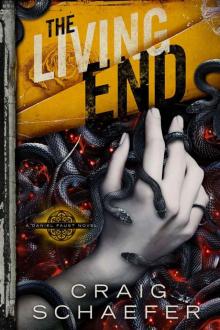 Daniel Faust 03 - The Living End
Daniel Faust 03 - The Living End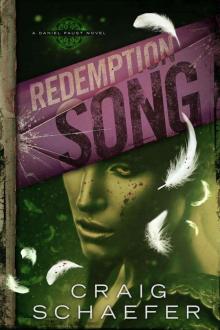 Redemption Song (Daniel Faust)
Redemption Song (Daniel Faust)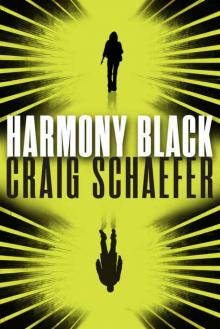 Harmony Black (Harmony Black Series Book 1)
Harmony Black (Harmony Black Series Book 1)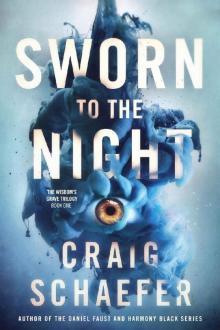 Wisdom's Grave 01 - Sworn to the Night
Wisdom's Grave 01 - Sworn to the Night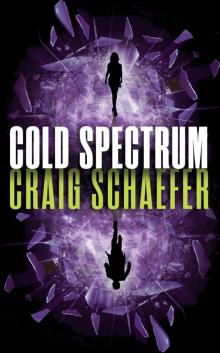 Cold Spectrum
Cold Spectrum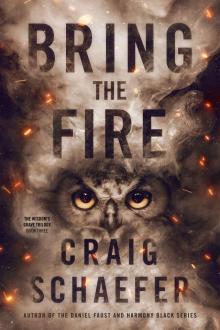 Bring the Fire (The Wisdom's Grave Trilogy Book 3)
Bring the Fire (The Wisdom's Grave Trilogy Book 3) Winter's Reach (The Revanche Cycle Book 1)
Winter's Reach (The Revanche Cycle Book 1)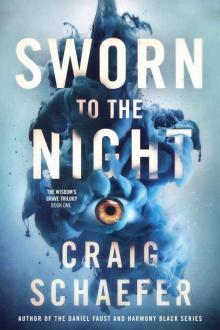 Sworn to the Night (The Wisdom's Grave Trilogy Book 1)
Sworn to the Night (The Wisdom's Grave Trilogy Book 1)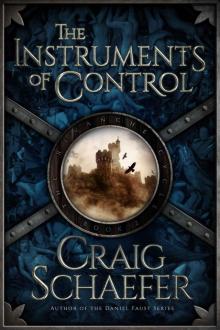 The Instruments of Control (The Revanche Cycle Book 2)
The Instruments of Control (The Revanche Cycle Book 2) Terms of Surrender (The Revanche Cycle Book 3)
Terms of Surrender (The Revanche Cycle Book 3)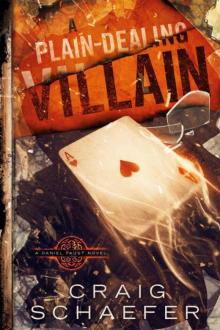 A Plain-Dealing Villain
A Plain-Dealing Villain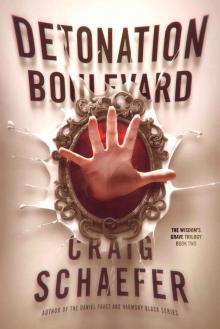 Detonation Boulevard (The Wisdom's Grave Trilogy Book 2)
Detonation Boulevard (The Wisdom's Grave Trilogy Book 2)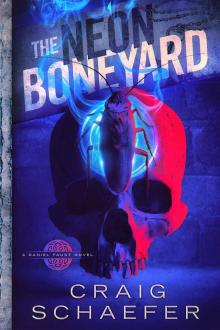 The Neon Boneyard
The Neon Boneyard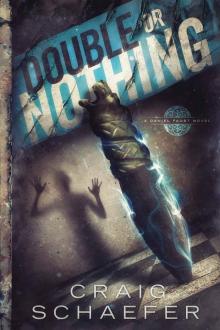 Double or Nothing (Daniel Faust Book 7)
Double or Nothing (Daniel Faust Book 7)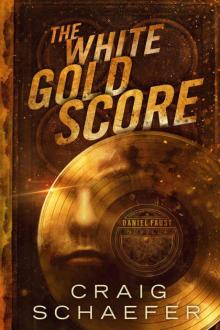 The White Gold Score (A Daniel Faust Novella)
The White Gold Score (A Daniel Faust Novella)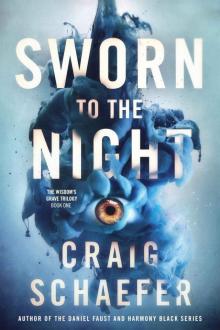 Sworn to the Night
Sworn to the Night